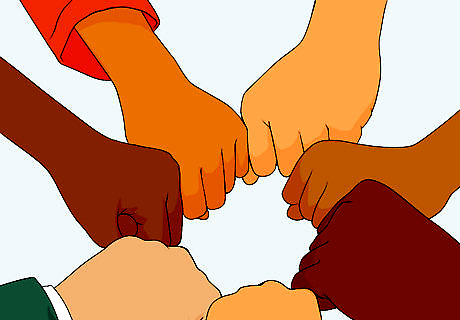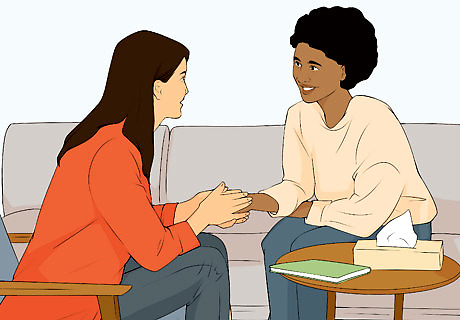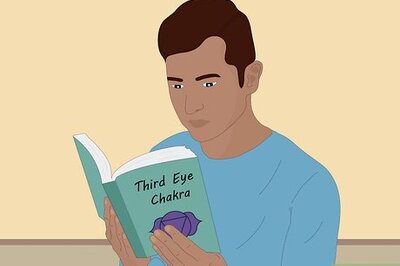
views
Adopting Cynicism

Focus on your frustrations. The guy who asked to borrow your phone, then ran off with it. The girlfriend who accepted your shower of gifts while cheating on you. The uncle who tricked your ailing grandmother and stole your inheritance. The politician that, despite yourself, you almost began to trust, brought down in scandal. We’ve all been duped, tricked, used, played, and disappointed in life. It’s how you respond that can make you a cynic. Optimists toss aside such disappointments as aberrations. Realists accept them as an unavoidable part of life. Cynics cling to them as proof that people should be assumed to act selfishly. A cynic need not espouse a “fatalistic pessimism,” a view that people have to be selfish cheats and liars. He or she just relies on the evidence that people are that way.

Expect more of the same. Regardless of the actual origins of “Murphy’s Law,” the notion that “anything that can go wrong, will go wrong” sounds like the work of a true cynic. By holding onto their past frustrations as the proof of true human motives and behavior, cynics come to assume more of the same until proven otherwise (if even then). While on the subject of famous adages, a cynic would certainly also subscribe to the saying “fool me once, shame on you; fool me twice, shame on me.” People have proven themselves selfish and duplicitous so often that, in the cynic’s mind, it is only prudent to assume more of the same.

Doubt everyone’s motives. Cynicism began long ago as a philosophical quest for true virtue, and today’s cynic still need not believe that every human being must inexorably be a lying, cheating thief who cares only about himself. It’s just sensible to start with that assumption. If you want to train yourself to be a cynic, you need to practice looking for the selfish motives that can (and in the cynic’s mind, most likely do) hide behind any seemingly selfless act. It’s rather simple for us to presume that a politician says she cares about the poor only so she can get their votes, then sells out their interests to the rich and powerful. However, you may need to practice thinking — perhaps by brainstorming — about ways that superficially selfless acts like running an animal shelter or collecting funds for charity can be far from it. Over time, you’ll begin to presume people doing such things are attention-mongers seeking a reality TV show or are running an elaborate money-laundering scheme, and be unsurprised whenever your presumptions happen to prove true.

Speak your mind. After all, what’s the point of seeing the hypocrisy and deceitfulness in life if you don’t tell anyone about it? Deep down, cynics want the world to be a better place, they just don’t know what they can do beyond pointing out its endless flaws. If, as they say, the first step toward a solution is identifying the problem, then cynics can rest assured that they play a valuable role by pointing out bad behavior when they see it. It will just have to be up to someone else to provide the remainder of the steps. Many a comedian, talk-show host, and author has made a living by expressing his/her inner cynic. Stock phrases for a cynic can include: “Yeah, right”; “Oh, c’mon”; “Get real”; and even a simple “Ha!” Other cynic’s tools include a good scoffing sound, eye roll, shoulder shrug, smirk, and waving-off motion. If you are concerned that your cynicism is too hurtful to others or makes you seem like a jerk, try to think of calmer, more reasoned ways to make your point. People still probably won't like what you have to say, but they may respond better to a reasoned argument against their hope that the next President can make things better, as opposed to your trademark scoff and dismissal.

See the humor. Dark humor is a central element of the cynic’s worldview. Without it, the world would just be too depressing. Comedians and TV personalities play cynicism for laughs, and so can you. Cynics have been known for their biting humor from the start. It is said that the famed Greek Cynic Diogenes, enjoying a pleasant day in his ragged, penniless glory, when asked what he wanted by the all-powerful conqueror Alexander the Great, replied something along the lines of: “For you to stop blocking my sun.” In modern times, your cynical humor might go something like: "Well, at least the political gridlock in Washington keeps them from raising our taxes or starting another war." Honestly, many of the greatest comics are at least partial cynics, so perhaps you should look to them for comedy tips. When you see the world as the cynic does, your options are probably laughing or crying. Most will enjoy life more by choosing the former.

Know you’re in good company. The concept of cynicism has surely been around as long as our species, whether you believe it was Eve doubting God’s motives for keeping those apples off-limits, or an early human ancestor figuring that his friend’s walking on two legs was just a ploy to seem taller. Cynicism in the ancient Greek world was a philosophical perspective championed by individuals such as Diogenes (c. 412 BC - c. 323 BC). Cynics shunned materialism, superficiality, and shame as signs of man’s self-centeredness and instead focused on finding true virtue through living simply and speaking simple truths, whether people wanted to hear them or not. Modern cynics claim people ranging from Friedrich Nietzsche to David Letterman as members of the club. You don’t have to live like dogs or treat others like dogs (the Greek root of the word “cynic”) anymore to be a cynic, just expect, observe, and express the superficiality and pretense that surrounds you.
Weighing Pros and Cons

Reduce your experience of disappointment. While cynicism is in many ways born out of disappointment, it can also be a way to avoid the experience of it. Essentially, if you always presume the worst, it is very difficult to be disappointed. Few experiences can be more crushing than having a hero exposed as a charlatan, or having someone you seemingly know and trust be revealed as a huckster. By removing expectations that someone is acting honorably or honestly, the chance of disappointment is also removed. This is akin to the notion of avoiding heartbreak by never allowing oneself to fall in love, and can be equally questioned as a worthwhile way to go through life.

Live as someone who questions everything. As many a TV drama can attest, a cynic can make a fine detective or investigator. By presuming ulterior motives and hunting for hypocrisies, a cynic is unlikely to live an “unexamined life.” Cynics have been known to question everything from religious belief to, in Diogenes’ case, the need to carry around a drinking cup when two cupped hands can do the job just fine. Only by constant questioning, a cynic would say, can one approach essential truths, or at very least determine the best of several bad alternatives. Living without beliefs to cling to, however, can feel like being adrift at sea without a life raft.

Be willing to lose the potential bliss of optimism / ignorance. Some cynics think of themselves as “sorely-disappointed” idealists with a “fatal love of virtue.” Replacing hope with doubt may provide a clearer picture of the world as is, but the loss of those “rose colored glasses” can make looking around much more difficult. From Diogenes’ days of living in a barrel to the present time, no one said being a cynic made life easier. The truth hurts.

Risk denigrating others with disapproval. Speaking of the truth hurting, not everyone is prepared to hear a cynic’s criticisms, nor are all cynics capable of or even concerned with sharing these views without causing hurt. While a cynic gets to enjoy exposing a fraud, putting a poseur in his place, and mocking the superficial blowhard, the price can be many awkward confrontations and probably some broken relationships. The life of a cynic can be a lonely one, with friendships often limited to others of the same inclination. Your little group might not be invited to a lot of parties.

Decide if cynicism helps or harms. Some will say cynics do far more harm than good by destroying the ability to trust and harping on the negative; others say they help make the world better by exposing just how difficult it is to make progress and yet how urgent it is to do so somehow. Cynics don’t tend to make in-demand commencement speakers, but that doesn’t mean that their message isn’t at least as valuable as the “you can do it!” optimist. Studies have shown that cynics tend to have worse psychological and physical health, relationships, and even socioeconomic status. So always be aware that your cynicism likely comes at a personal cost. Cynics might want to see themselves as selfless people in a selfish world, giving up some measure of happiness in order to shine the light on all our flaws. Whether you believe that to be true probably depends upon how cynical you already are.




















Comments
0 comment